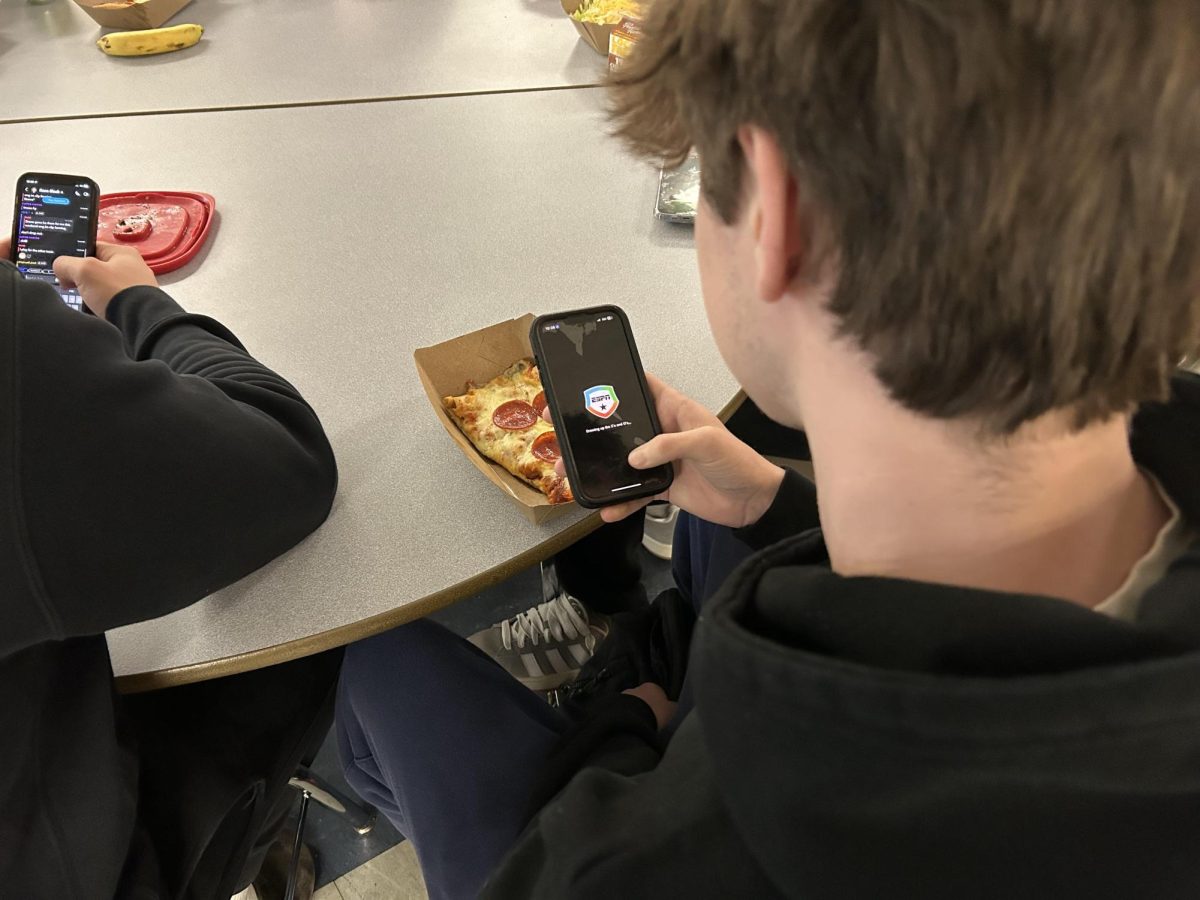 You can walk into any Loy Norrix classroom and see several students on their cell phones while the teacher is talking or during independent work time. Some teachers allow cell phones to a certain extent, for research or to listen to music, but students abuse the rules. Other teachers do not want cell phones out at all, yet students still use them.
You can walk into any Loy Norrix classroom and see several students on their cell phones while the teacher is talking or during independent work time. Some teachers allow cell phones to a certain extent, for research or to listen to music, but students abuse the rules. Other teachers do not want cell phones out at all, yet students still use them.
Page five of the 2016-2017 Kalamazoo Public Schools’ Student Code of Conduct says electronic devices are not to be used during class period or passing periods, but before school and after school or if given permission by teachers they may be used.
I believe that the cell phone policy should be enforced. Teachers should start confiscating cell phones that are in use and returning them to students at the end of the day. Teachers should start writing referrals for students who have their cell phones taken. If students refuse to listen, teachers could send the student to the office and call their parents.
Why Phones Don’t Belong in School, an article on The Huffington Post reported that, “A London School of Economics Study found that schools that have banned cell phones experienced a substantial improvement in test scores.”
Students go to school to get an education, not to sit on their cell phones. Cell phones take the attention away from learning and cause major frustration for teachers. Teens are very addicted to their cell phones and will often use them during a lesson.
Most students would try to sneak their cell phone whenever possible, but cell phone bans in Lakeview High School, Galesburg-Augusta High School, New York City schools, Paramount Charter Academy and many private schools have been successful; those schools confiscate phones if students students don’t comply with the policy.
According to Mom Junction, a website dedicated to giving mothers advice on children and teenagers, cell phones have seven negative effects on students: teen tendonitis, stress, sleep loss, driving accidents, increased anxiety, risk of brain cancer and cyber bullying.
With the policy enforced the stress and anxiety to constantly check phones should decrease because students will be focused on work.
Junior Jennifer Gonzalez said, “Banning cell phones is not a good policy, parents need to communicate with their child at all times.”
There are office phones that students are able to use to call parents if needed, or parents can call the school to contact their child.
“I can contact the child through the office if there an emergency during school hours,” said Martha Cutler, a parent of a high schooler at Battle Creek Central.
Pros to having cell phones in class are cell phones enable teachers and students to use remind 101, which sends reminders to their students about tests or assignments. Phones can also be used if you need a calculator, to look up an answer for a teacher, take pictures of notes on the board, mark an event in your calendar or email your counselor.
Health Research Funding has said instead of rejecting this amazing technology, schools should embrace it, since phones can be used as a tool for teaching as well.
Cons to having cell phones in class are cell phones can create drama and enable cyber bullying. Students can focus on the teacher and that will help them to understand what is being taught. Students can get a lot of help from their teacher if needed or just look for answers in textbooks.
Not only can cell phones be distractions for individual students, they can also disrupt the entire class with ringing, beeping or buzzing, especially during a test, lecture or study period, said alot, a site that has a variety of information about different topics.
With the use of cell phones students are able to look up answers right away, but that is part of the problem teachers are having. Students use cell phones to cheat by looking up answers, texting answers to other students or taking pictures of tests.
“Cell phones have the potential to be a wonderful asset, but students don’t understand how to fully use them in the classroom,”said history and economics teacher Ryan Allen.
Wagenaar says that cell phones are taking away from her teaching because students aren’t paying attention to her, although she allows them to use cell phones for music, reading books and looking up vocabulary when she’s finished with her daily instruction.
Cell phone usage can have some advantages in school, but there are other ways to gain information without the use of phones such as books dictionaries, computers, taking notes in class or asking a teacher.
Enforcing the cell phone policy will help students focus on learning. With cell phones being banned during school hours, teachers won’t have to stop class to take phones, write referrals, fight with students and call parents. Not being able to use cell phones until the end of school may seem a bit drastic, but it will open student’s minds to the idea of using other sources to get information and it will decrease the risks that cell phones at school cause.
“Banning cell phones would be great, but students would fight for their phones,” English teacher Sally Wagenaar said, “It would be a headache.”
Many student fights are instigated through the use of cell phones. Students will bring up drama that happened on their cell phones in the classroom and start an argument or fight. Students also use cell phones to take pictures of other students and make fun of them or post stuff about them online while they are in class. It’s hard for teachers to discipline these students without the students making a scene. I have seen some students argue and threaten teachers for their cell phones.
“I think they think it’s cool to and they’re not going to get caught,” said sophomore Kailynne Besser, in regards to students using cell phones for bullying.
Usually when students are fighting over the use of their cell phone, that’s an indicator that they could be addicted to their device. Students have a constant need to check their cell phones even while in class, or they will start to have withdrawals and become very anxious. Cell phone addiction in students is another reason a cell phone ban is a must.
CNN said, “Nearly 80 percent of teens, in a survey, check their phones hourly, 72 percent feel the need to immediately respond to texts and messages.”
Allen said he gives his students a verbal warning if they are caught using their cell phones in his classroom. If it becomes an issues he takes the phone away. “Students don’t like being limited from their devices, but they comply.”
Categories:
Enforcing the Cell Phone Policy is Better for Learning
January 25, 2017
0
More to Discover







